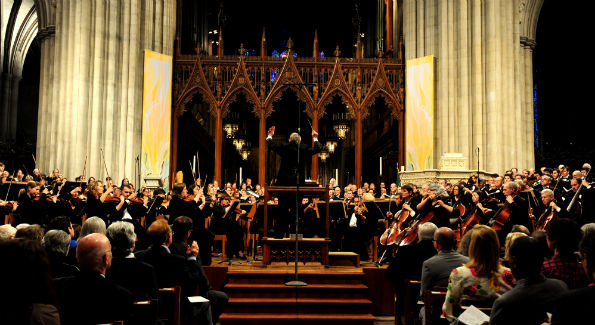REVIEW: The City Choir of Washington celebrates the jubilee of Queen Elizabeth II’s coronation.
By Patrick D. McCoy

Robert Shafer conducts the City Choir of Washington and the Shenandoah Conservatory Choir at Washington National Cathedral. (Photo by Russell Hirshorn)
For The City Choir of Washington’s celebratory concert marking the 60th Jubilee of the coronation of Queen Elizabeth II, there was no stone left unturned. A huge orchestra, the swelled ranks of singers, including the Shenandoah Conservatory Choir, and the grand space of the Washington National Cathedral all signaled that the music would be fit for a royal occasion. But surprisingly, the unaccompanied works, particularly the world premiere of Sir John Tavener’s “Three Hymns,” were the most musically stunning of all that crowned the afternoon. Robert Shafer led the massed forces in the afternoon of festive pomp and circumstance.
On the surface, the choice of venue was the perfect setting for music of such proportions. However, as with past concerts by similar ensembles, the acoustics of the cathedral seemed to amplify the instruments above the choir. Overall, if the effect sought for the afternoon was the air of regal grandeur, it was achieved.
Three pieces by Ralph Vaughan Williams opened the concert. The regal setting of “All People that on Earth do Dwell” (Old 100th) was marked by the brilliant majesty of the organ played by J. Thomas Mitts and the orchestral brass. Sung by the massed choir in a variety of vocal combinations on the stanzas, the inner acappella verses were the highlight of the piece, along with the solo trumpet obbligato that meandered above the choir. The festive “O Clap Your Hands” followed, further highlighting the important role of the organ in moments of celebration. Concluding the group was “O Taste and See” in which soprano Callie Schlegel offered a clear solo that projected effortlessly into the cavernous space.
Charles Villiers Stanford’s unaccompanied “Beati quorum via” was a glorious gem in the vast spaciousness. The beautiful voices blended wonderfully in the reverberation of the cathedral. The accompanied pieces, however, were less effective. C. H. Hastings Parry’s coronation anthem “I Was Glad” did not have the expected impact. The full orchestra and organ gave an expansive introduction, but the choir’s entrance did not match the triumphant tone set by the instruments. A similar experience was felt in G. F. Handel’s “Zadok the Priest.” Following a long crescendo that ultimately builds to the choir’s entrance, the listener was left to feel that the inherent grandeur of the work was accomplished by the instruments alone.
The glowing moments of the program came in the world premiere of “Three Hymns” by Sir John Tavener. Recalling almost the antiphonal effect of centuries past, Tavener employed the use of an echo choir that sang from the extreme rear of the cathedral. In “Heaven,” the effect was stunning as the large choir in the front of the church was answered by the ethereal voices of Third Practice. “Love” and “Life” were more direct in nature, with the occasional interjection by the orchestra. Ending in a quiet, contemplative nature, the prayerful pieces clothed the atmosphere with an aura of reverence. “Tolstoy’s Creed” was a powerful affirmation that was further communicated by the dialogue between the choir and organ.
Further making the connection between “old” and “new” were two comtemporary works; “Lux Aurumque” by Eric Whitacre and “From Heaven Distilled a Clemency” by Tarik O’ Regan. Both works were sung with significant attention to precise intonation and exceptional blend of the choral voices.
In Leonard Bernstein’s “Chichester Psalms,” the balance between the voices and instruments seemed to ‘gel’ more naturally. Based on Hebrew settings of the Psalm, the rendering of the work was poignant, especially in the angelic ‘Adonai” sung by the young soprano Esther Ullberg. The smooth legato lines sung by the women of the choir were complemented by the rounded, resonant texture of the male voices. Ending the program was Shafer’s ebullient setting of “God Save the Queen.”
At a post reception, the composer, Tavener, was presented with an honorary doctorate from Shenandoah Conservatory by Dr. Tracy Fitzsimmons and the dean of the conservatory, Dr. Michael Stepniak. Also in attendance was Dr. Jeffrey Gedmin of the the Legatum Institute (London, England) and a former student of Shafer who made the collaboration possible.
Recently named among the Forty Under 40 for his contributions to arts and humanities, Patrick D. McCoy received a B.M. in vocal performance from Virginia State University and a M.M. in church music from the Shenandoah Conservatory in Winchester, Va. He has contributed arts and culture pieces to CBS Washington, The Afro-American Newspaper and the newly published book, “In Spite of the Drawbacks” (Association of Black Women Historians), which includes his chapter on legendary soprano Leontyne Price. McCoy has interviewed some of the most acclaimed artists of our time, including Renée Fleming, Denyce Graves, Norman Scribner, Julian Wachner, Christine Brewer and Lawrence Brownlee. Listen to these interviews and others at Blog Talk Radio. McCoy may be reached via email at wlperformingarts@aol.com and on Twitter @PatrickDMcCoy.




